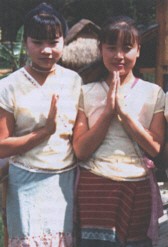Western Lawa people live in two main regions of Asia. The majority (approximately 55,000) inhabit China's Yongle and Zhenkang counties in Yunnan Province, while numerous Western Lawa villages are also found in northern Thailand's Chiang Mai and Maehongson provinces. The Western Lawa generally inhabit thickly forested mountainous areas. There may also be a small number of Western Lawa in Myanmar. An additional 30,000 Bulang people in China speak Western Lawa as their mother tongue.The Western Lawa language is unintelligible to the Eastern Lawa language spoken in northern Thailand. The majority of Western Lawa in China are now bilingual in Mandarin, while those in Thailand can speak Northern Thai. Western Lawa is related to other Mon-Khmer languages in southern China and northern Myanmar.The Western Lawa in China are officially considered part of the Wa minority group, although they never participated in the head-hunting for which other Wa people are infamous. The Western Lawa adopted Theravada Buddhism under the influence of the Tais many centuries ago. Consequently, they became a more peaceful people than their wild head-hunting cousins.
Western Lawa women like to wear lots of jewelry and intricate embroidery and adornment on their blouses and dresses. Large earrings are common, especially in China. In the past, the Lawa had no written form of their language, so they communicated by sending objects to other villages. Sugarcane, banana, or salt meant friendship, but pepper meant anger, feathers urgency, and gunpowder and bullets the intention of clan warfare.
A curious religious mix exists among the Western Lawa. Although the majority of this group professes Theravada Buddhism, their beliefs are mixed with animistic practices and spirit appeasement. Hundreds of Christian churches are also found among their villages in south-west China. Christianity has made less of an impact among the Western Lawa in Thailand, although there are small pockets of known believers among them.The forefathers of the 10,000 Western Lawa Christians first received the gospel from the American Baptist missionary William Young in the 1920s. Their conversion was not obtained by forceful preaching as much as by Young's sacrificial love. Once, in 1924, Young came across a sick woman left to die in a ditch outside a Lawa village. Guessing she was a victim of smallpox, 'Young immediately erected a shed and washed her sores continuously for three days. To draw out the pus, Young did not hesitate to use his own mouth. His devotion and compassion opened the hearts of countless (Lawa) to receive his message.'
Many Western Lawa churches today are liberal and syncretistic. Many people attend church out of tradition rather than in pursuit of a living relationship with Christ.
Pray for the Holy Spirit to do what only he can do to revive Lawa churches and families.Pray that soon they will be part of God's ambassadors to Buddhist and animistic peoples in Thailand.Pray for God to give them an abundant harvest as a testimony of his goodness and power.
Scripture Prayers for the Lawa, Western in Thailand.
Peoples of the Buddhist World, Asia Harvest, Copyrighted © Used with permission.
| Profile Source: Joshua Project |










